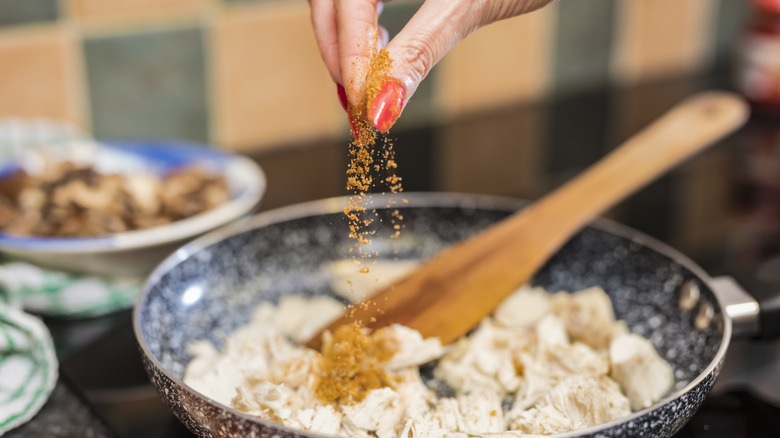Why You Should Season Hot Food Less Than Cold
Determining how to properly season your food is not as simple as it may seem. When crafting a complex flavor profile in a dish, there are more factors at play than simply which herbs and spices you decide to add to it. To get the inside scoop on proper seasoning techniques, Food Republic spoke to Jennifer Kellison, the director of innovation at Frontier Co-op and Simply Organic.
She shared that the temperature of your food actually plays a large part in how flavors develop. "At higher temperatures, our taste buds are more sensitive, and flavor is enhanced," Kellison told us. "When food is hot, it releases more aroma and intensifies flavor — while cold food typically needs more seasoning." Because heat has an effect on the flavor release of spices, you should limit the amount of seasoning that you place on dishes that are intended to be enjoyed warm.
For example, a steak that is hot off the grill will only require a dash of flaky salt to bring out the flavors of the meat. Meanwhile, a cold soup or crisp salad might benefit from a few extra spices to avoid tasting bland.
Take your time when seasoning your food, especially if it is meant to be enjoyed hot. You can always add more spice to a dish that calls for it, but it is much harder to remove the excess flavor from an entree that has already been generously seasoned.
Don't rely on temperature to fix an over-seasoned dish
While temperature plays a major part in how much or how little to initially season your food, a change in temperature isn't likely to fix an accidental over-seasoning. Jennifer Kellison explained that if you initially added too much salt to your sizzling steak, it is likely going to taste too salty even after the entree has cooled. When attempting to stabilize the flavor profiles in your dish, it is best to experiment with additional ingredients that can provide a balance to your palette rather than rely on the temperature.
Kellison advised using dairy products like milk, cream, and yogurt in a dish that is too spicy or overly salty. Acidity is another great option for cutting through those savory seasonings by adding a drop of citrus juice or vinegar to your recipe. Cane sugar and honey are also great resources for balancing the flavors in an overly seasoned dish — although you should use them sparingly to avoid transforming your meal into an overly sweet one.
While you can rescue an oversalted sauce with a slice of potato, Kellison said that "if you're working with a base like water, broth, stock or sauce, adding more of that base can help mellow a dish." Similarly to seasonings, the best way to balance out your dish is to add in small amounts at a time, careful not to overcompensate and accidentally remove all flavor from the food by adding too much base back in. When it comes to proper salting and seasoning, there really is a delicate balance to maintain.


